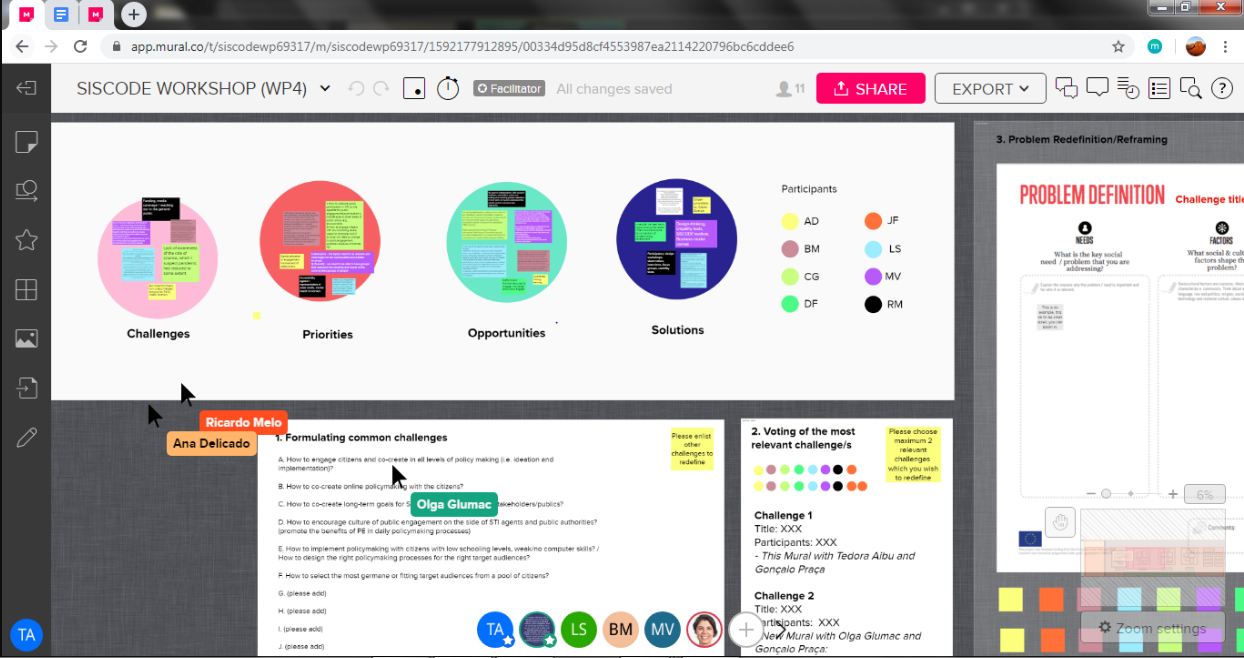On 16 June, Sociedade Portuguesa de Inovação (SPI) and Ciência Viva hosted a 2-hours digital workshop for the Portuguese policymakers on the Co-Creation for the Public Engagement in the Science, Technology and Innovation (STI) practice and policymaking.
The workshop aimed at assessing the ongoing local and national practices of Public Engagement in STI policymaking and providing support to development of peer guidance for the stronger Public Engagement promotion and practice, and possibly according to the SISCODE framework. In total, there were eight participants from private and public sectors, one observer and three co-facilitators.
Through interaction and exchange of knowledge and practice few joint and concrete common challenges were identified of which the former was chosen for the discussion:
- How to encourage culture of Public Engagement on the side of STI agents and public authorities (promote the benefits of Public Engagement in daily policymaking processes);
- How to engage citizens and co-create in all levels of policymaking (i.e. ideation and implementation);
- How to create a forum for all the stakeholders to meet, share challenges/opportunities, promote the matchmaking of interests and projects, and develop joint initiatives.
The workshop also served to introduce the use of SISCODE framework and tools for operationalisation of the co-creation in practice and policymaking.
Key outcomes include:
- Identification of several key challenges in the application of Public Engagement in STI policymaking in Portugal. Some other noteworthy challenges were also identified: how to engage scientists and persuade them that co-creation is relevant and useful; how to structure public engagement processes that are fit for purpose and audience; and how to co-create long-term goals for STI policymaking with local stakeholders/publics.
- Identification of key needs, factors and evidences that Public Engagement in STI policymaking is indeed in need of reformation. There were a high number of ideas and notions shared, however, those that are worthy of a mention include: there is a biased manner in which the participatory culture is viewed; citizens are perceived to have a low level of knowledge in STI even if many of them are highly educated; there is a general idea about existing ‘mistrust from citizens’ when it comes to their involvement as opposed to the fact that citizens do participate when interested/stimulated; ongoing lack of transparency in public decision-making; point of view of policymakers tends to differ from that of the practitioners; and lack of awareness and interest from the industry and media to popularise co-creation as a common practice.
- Sharing of credible information as a form of knowledge-transfer between the participants of the workshop. More than three of the participants shared and offered to further collaborate by sharing published studies (e.g. on the citizen participatory culture which exists in Portugal) and examples of consultations provided by several platforms/projects. Examples of platforms that use/d PE in their consultation shared by the participants are:
- Open discussion and debate over the multiple means of application of Public Engagement. The communication platforms used for the workshop allowed the participant to communicate through writing and speaking simultaneously. Thus, participants were given the floor to express their views and takes on the local culture of Public Engagement in STI policymaking and what needs further improvement.
The workshop brought together well-informed national policymakers and decision-makers/influencers in STI to discuss the existing gaps for the involvement of public or citizens in the policymaking processes. The SISCODE organizer team encouraged continuous peer support and collaboration as well as guidance among the local participants in future ventures for Public Engagement in STI policymaking. The team thanks to all participants for their passion, contribution and joint follow-up actions.
